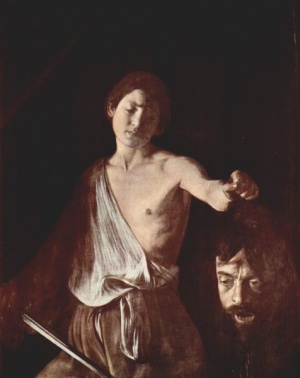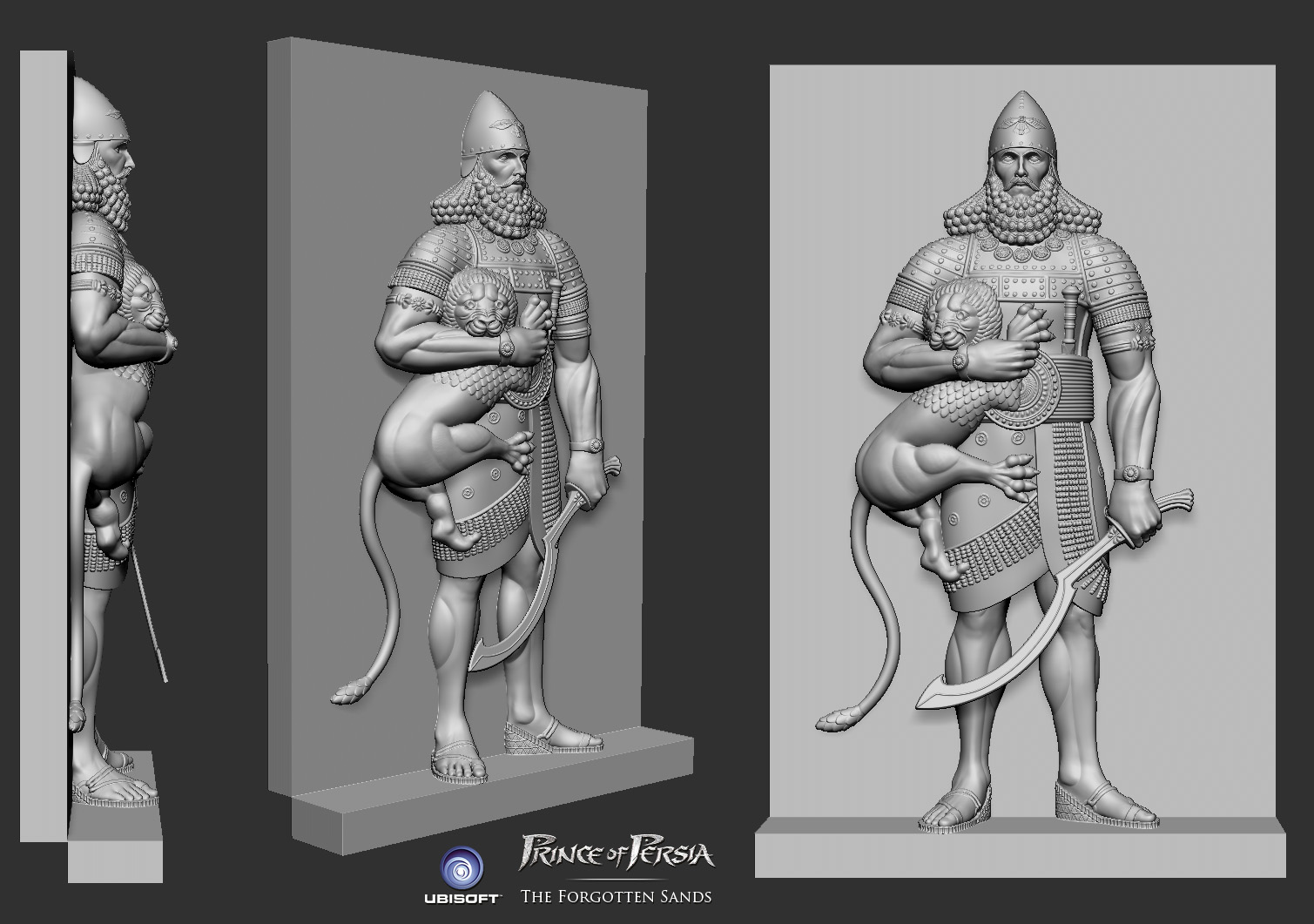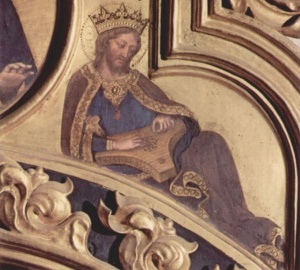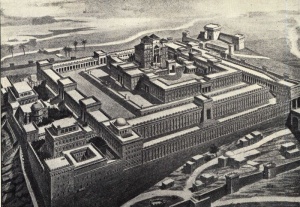David

Contents
His story
A complete account of the life of King David can be found in the Old Testament starting in 1 Samuel 16, the entire book of 2 Samuel, and 1 Kings 1-2. A slightly edited version of this story, along with some additional specifics of the king's reign, is also found in 1 Chronicles, particularly beginning in Chapter 11.
Youth
David was born in Bethlehem as the eighth and youngest son of Jesse. After Saul's disobedience to God (see 1 Sam 15), the Lord ordered the Prophet Samuel to Bethlehem to visit Jesse and anoint one of his sons as the new king. As the youngest, David was left in the fields to tend the sheep while the holy man was visiting his father; however, the Lord revealed to Samuel that none of the first seven sons was his Chosen One, and Samuel inquired of Jesse whether he had another son. Then David was called, and Samuel was told to anoint him. A notable quotation concerning David's righteousness occurs in this passage:
- But the Lord said to Samuel, "Do not consider his appearance or his [i.e. Eliab, another of Jesse's sons] height, for I have rejected him. The Lord does not look at the things man looks at. Man looks at the outward appearance, but the Lord looks at the heart. (1 Sam 16:7) 1
Thus David became the Anointed One of the Lord at a young age. Soon he was called upon to visit the court of Saul, who, having forsaken the Lord, was tormented by demons. David was already a talented harp player, and the music he made soothed Saul. Saul liked David and made him his armor-bearer; David also became fast friends with Saul's son Jonathan.
Flight from Saul
David's popularity among the people soon grew; their refrain "Saul has slain his thousands, and David his tens of thousands,"1 implying that David was a mightier warrior, began to haunt Saul, and he became increasingly jealous. Twice while David was playing the harp for Saul, Saul tried to kill him; after the second time he ran away into the field, where he met with his dear friend, Saul's son Jonathan. Together they devised a way to find out Saul's intentions towards David and an inconspicuous signal for Jonathan to give to David. When Saul's anger flared upon finding out that David supposedly had gone home to Bethlehem, Jonathan knew that his father intended to kill David, and told him so. Thus began David's lengthy exile.
David fled from Saul first to Nob in Israel, where he was helped by the high priest. He then went to the neighboring states of Gath and Moab before coming back to Judah. By then, Saul had the high priest of Nob and (almost) all his sons killed for aiding David. By his time, David had a small force behind him, and the priest of Nob’s one remaining son came and joined them. David’s men next, by the guidance of the Lord, went and defeated a band of Philistines at the city of Keilah.
At this time, David learned that Saul was coming to Keilah to kill him, and so he escaped. Twice during this time David spared Saul's life, not wishing to lay a hand on the Anointed of the Lord. David and his men continued to hone their fighting skills, all the while running from Saul; they returned to Philistine territory (Gath) again and were protected by the king there for a year and four months. When the Philistines were about to battle the Israelites, though, they sent David away due to fears about his allegiance to them. So he went instead to fight the Amakelites, a tribe that had just plundered parts of both Philistine land and Judah; this victory was a great success for David.
Things weren't looking up for Saul, however. In a battle with the Philistines three of his sons were killed, and Saul was surrounded and critically wounded. He ended up committing suicide, having himself run through with his own sword. When David heard the news, he lamented the deaths bitterly, particularly that of his friend Jonathan. He then had an Amakelite who Saul had asked to kill him executed for harming the Lord’s Anointed.
King David
So David went up to Hebron in Judah and was anointed its king there. He still was not the ruler of Israel proper, though, and Abner son of Ner, commander of Saul's army, set up another of Saul's sons on its throne, dividing Israel. Infighting between the houses of Saul and David plagued the land for seven years. Over time David grew continually stronger while the house of Saul was weakened. Eventually Abner came to David and offered to give him the kingship of all Israel, and David agreed with the condition that his first wife, Michal, Saul's daughter (who had already remarried) be returned to him.
Then the leaders of all Israel's tribes joined together at Hebron, anointing David king over Israel. At this time David was thirty years old and had ruled Judah for seven years; he went on to rule all Israel for another thirty-three.
David next decided to have the Ark of the Covenant brought to Jerusalem; however, after one of the delegation sent to retrieve it, Uzzah, was struck down by God when he touched the Ark, attempting to steady it, David had second thoughts and had it placed in the home of a man near the city. Eventually, seeing the prosperity of this man's household increase, he brought the Ark into Jerusalem with great ceremony. Seeing the magnificence of his own palace but the Ark only protected by a tent, King David wished to build a temple to house the holy artifact. But the Prophet Nathan came to David and told him of a revelation he received from the Lord, saying that David was not the one chosen to build the Temple, though one of his sons would.
All throughout his reign, David was impressively victorious in military matters: "The Lord gave David victory wherever he went"1 (1 Chr 18:13b). He defeated the Philistines, capturing Gath, and defeating the Edomites, the Moabites, the Arameans, Hadadezer king of Zobah, and numerous other tribes/nations whose names none of us can recognize today.
David's family
At least eight of David's wives are named in Holy Scripture. The first, Michal, Saul's daughter, is noted for scorning David’s prophetic dance upon receiving the Ark of the Covenant; this is why she was said to be barren. The second, Abigail, had lived with her husband Nabal in Carmel when David came through in his flight from Saul. While Nabal refused any aid, Abigail secretly interceded, bringing David many supplies. Afterwards, when Abigail told her husband of the help she had given David, he dropped dead from (seemingly) a heart attack, leaving Abigail free to marry David. The other wives listed (see 1 Chr 3) were Maacha, daughter of Talmai king of Geshur; Haggith; Abital; Eglah; and Bathsheba, mother of Solomon. He also took "more wives" in Jerusalem. In all, 1 Chronicles lists by name nineteen sons of David.
Several episodes in David’s family life are noteworthy. The first is the famous affair with Bathsheba, one of the few happenings that shows any weakness in King David. One evening the King began to walk around the rooftop of his palace, which overlooked the surrounding city. He saw below him a beautiful woman taking a bath and was seized with lust. He summoned the woman, Bathsheba, to his palace and slept with her. Unfortunately, Bathsheba conceived a child because of this encounter, and her husband Uriah the Hittite had been away on the spring military campaign for some time, making it impossible to claim he was the father. So she sent a message to King David, who immediately called Uriah back to Jerusalem, hoping that he would sleep with his wife. Uriah, however, refused to enter his home, sleeping outside on the steps, out of solidarity with his fellow soldiers camped in tents far from home. The next day David tried to get him drunk and have him go to his house, but this failed as well. So David panicked and sent Uriah back to his commander with an order to put him on the front lines and then withdraw from him, effectively having him killed. Uriah the Hittite then died in battle, and David married Bathsheba. The Lord would not let the affair go unpunished, though, and sent the Prophet Nathan to David to rebuke him, finally telling David that the child would die. David mourned for his son, spending seven days fasting, weeping, and entreating the Lord for the life of his son, but the child died after this time. Solomon, the future king, was born to David and Bathsheba following the death of their first son.
The next family drama involves Amnon, one of David’s sons, and Tamar, sister of Absalom (another of David's sons). Amnon fell in love with Tamar, but Tamar was a virgin and refused to have Amnon. Thus Amnon devised a scheme, pretending to be sick and requesting that only Tamar come to his bed and make him food. After he had ordered everyone to leave, Amnon overpowered the resistant Tamar and raped her. Afterwards she pleaded with Amnon to at least marry her and take away her shame, but Amnon sent her away. She went to live in her brother Absalom’s house, despairing her remaining days. Absalom harbored a terrible grudge against Amnon ever after, and two years following the rape he gathered a banquet to which he invited all the king’s sons. Then he killed his brother Amnon.
Absalom continued to cause further trouble after this. Despite the fact that several years later David summoned his son back to Jerusalem and eventually forgave him, after a few more years Absalom rose in popularity amongst the people. He then told David he wished to go to Hebron and worship, but while away he sent messages to all the tribes of Israel, fomenting a revolt to take the throne for himself. David was finally forced to flee Jerusalem because of the uprising, and Absalom claimed his father's palace and all his concubines. But David had an advisor loyal to him claim to defect to Absalom, and this advisor gave advice that defeated Absalom. David sent specific orders to all his men to only capture Absalom and bring him back unharmed; however, when Absalom got stuck in some low-hanging tree branches riding his horse, David's military commander Joab (who liked to take matters into his own hands and kill people) drove three javelins into Absalom’s heart while he was still hanging from an oak tree. David mourned bitterly for his son, after which he returned to Jerusalem.
Finally, when David was on his deathbed, another son, Adonijah, conspired with Joab to have himself made king. Bathsheba and the Prophet Nathan counterconspired, though, pleading with David to make Solomon king and informing him of the rebellion of Adonijah. So David had Solomon anointed King of Israel. Adonijah accepted this, with the condition that he be given David’s bedside nurse Abishag as a wife.After several more episodes of turmoil, David called Solomon to his deathbed and gave him advice on how to rule the kingdom. He died at the age of sixty-three and was buried in his city, Jerusalem.
David's legacy
As a type of Christ and model king
King David prefigures our Lord Jesus Christ in numerous ways. He was the Lord's Anointed One, or Messiah, a now title applied almost exclusively to Christ. Also, David was a shepherd before he was called to be king; likewise, Christ used herding imagery often in his earthly ministry, as in the Parables of the Good Shepherd, of the Lost Sheep, and of the separation of the sheep and the goats at the Last Judgment. When David was fleeing from Saul, he was an illustration of the Suffering Servant, most famously described in Isaiah 53; afterwards, though, he became the victorious king, gaining control over all Israel and defeating its enemies with ease. David’s story is mirrored by Christ's persecution by the Jews and Crucifixion, followed by his glorious Resurrection and his eventual Second Coming. David's humble origins and the fact that he was the least imposing son of Jesse when Samuel anointed him also parallel Christ's humble earthly status.
Furthermore, David consistently relied on the Lord and thus served as a model king. The Scripture accounts regarding David go out of their way to show his sense of fairness and justice. For example, David rewards all of his men equally, even those too exhausted to continue the chase, after his great victory over the Amakelites (1 Sam 30:23). This episode may be seen as reminiscent of Christ's Parable of the Workers in the Vineyard (Matthew 20). He refused to ever touch his adversary King Saul, was furious about the rape of Tamar, and lamented the death of his rebellious son Absalom, whom he had ordered that no one injure, etc.
As forefather of Christ
The concept of the Davidic line (i.e. that the ruler of Israel be directly related to David) became extremely important in Jewish history ever after David. Much of the reason for this can be seen in God's "Promise to David":
- ...I will raise up your offspring to succeed you, who will come from your own body, and I will establish his kingdom. He is the one who will build a house for my Name....I will be his father, and he will be my son…Your house and your kingdom will endure forever before me; your throne will be established forever.1 (2 Sam 7:12-16)
On the surface, this passage refers to Solomon, David's son, but it may also be extended to Christ. Christ was related to David through Joseph the Betrothed, who was of the Davidic line.
As musician: The Psalms
Besides his role as Saul's harpist, David composed a large number of the Psalms; whether every single one was written by the king is uncertain. Most of the psalms are prefaced by a few words in both the Septuagint and Masoretic texts, and 73 of the 150 (or 151, if the one deuterocanonical psalm is included) explicitly name David as their author. Other introductions give even more detail. For example, Psalm 51 (50 in the Septuagint), our most famous psalm of repentance, is said to have been written by David after Nathan confronted him about his affair with Bathsheba. In any case, David’s contribution to church music and liturgics cannot be ignored, as the Psalms figure prominently in Orthodox worship.
As Temple-planner
Although the Lord would not allow David himself to construct the First Temple in Jerusalem, he set aside much gold and finery from his spoils of war to be used in it. He bought the site of the future Temple, where he built only an altar. According to 1 Chr 28, David himself wrote out the plans for the Temple, which he gave to Solomon, and also arranged the priests who would serve there into divisions, as well as designating numerous weights and measures important in the Temple’s function.
Solomon, David's son, completed and dedicated the Temple after his father's death. It stood until approximately 586 B.C., when Nebuchadnezzar and the Babylonians captured Jerusalem.
External links
- OCA:Lives of the Saints (search for Dec 17 for the Feast of the Forefathers and Dec 31 for David, Joseph the Betrothed, and James the Just)
- Introduction to I Chronicles: King David
- wikipedia:David
- wikipedia: Temple in Jerusalem
- Come and see icons: Listings for David (Great icons of King David.)
- The Prophecies of King David
- King David
- 1 Scripture taken from the HOLY BIBLE, NEW INTERNATIONAL VERSION®. Copyright © 1973, 1978, 1984 International Bible Society. Used by permission of Zondervan. All rights reserved.
Categories > Church History
Categories > Church History
Categories > Church History
Categories > Liturgics > Feasts
Categories > Liturgics > Feasts
Categories > Liturgics > Feasts
Categories > People > Saints
Categories > People > Saints > Biblical Saints
Categories > People > Saints > Biblical Saints
Categories > Texts > Scripture > Old Testament > Prophets




